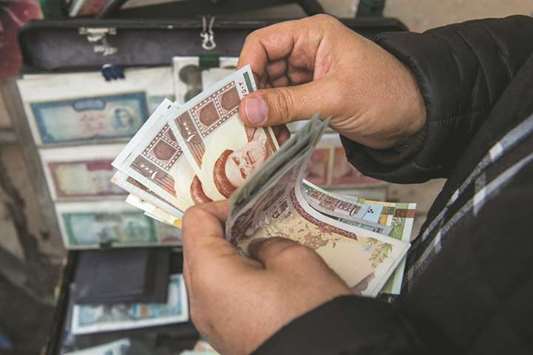For half a century, Payam’s family hardware firm near Ferdowsi Square has supplied Tehran’s builders with tools – through revolution, war and more recently sanctions. But it has rarely seen times as bad as these.
A slump in the value of Iran’s rial currency amid a tense standoff with the US has triggered a chain of events that’s paralysed money markets and businesses. Payam’s range of Bosch and Karcher products is hardly selling, and suppliers are wary of meeting new orders.
“Look at us, we’re sitting here playing with our phones,” he said, requesting his identity be shielded.
What’s bad for businessmen and women, is also bad for President Hassan Rouhani. He needs the popular support that a growing economy would bring to win a domestic struggle with conservative hardliners and entrench his more moderate vision for the country’s future. But a year into his second term, Iran appears to be sliding backward.
Authorities have blamed regional enemies for manipulating pressure on the rial. Yet it’s Iran’s escalating tensions with the Trump administration that’s the biggest driver of the instability. The US will decide by May 12 whether to stay in the 2015 nuclear accord that underpins many of Iran’s economic hopes, or possibly wreck it by leaving.
In recent weeks, Iranian officials ordered banks to raise interest rates on local currency deposits in an attempt to stem demand for dollars, and followed up with a reform of exchange rates and a crackdown on a black market blamed for weakening the rial. According to an April 14 report on state media, the central bank then halted its supply of foreign currency “for the time being,” while also banning exchange houses from carrying out cash transfers abroad through the popular havaleh system, known elsewhere as hawala.
The public affairs office of Iran’s central bank wasn’t able to answer questions put by phone for this story. A fax sent outside of normal office hours seeking a response wasn’t immediately answered.
Rouhani’s Economy and Finance Minister, Masoud Karbasian, has described the policy steps as “pre-emptive measures” to contain volatility ahead of any US decision to quit the accord. Together, the moves have brought some stability. But a lack of access to dollars and difficulties transferring cash abroad, has hit businesses hard, particularly those that need to import their wares or raw materials.
“Our main suppliers are closed,” said Payam. “The reason is the price of the currency. We’re waiting to see what Mr Trump will say.” The shutting of the havaleh network has made life even harder, he said. The company’s price list showed the cost of a German-made machine for stripping paint had risen 20% in two months, driven up by the rial’s depreciation.
Iran appears to be expecting the worst. Officials have publicly mulled possible responses to a US pull-out, including restoring its mothballed uranium enrichment or quitting the nuclear Non-Proliferation Treaty. They have also begun a so-far largely symbolic effort to reduce the importance of the dollar in Iran’s oil-dominated economy by announcing plans to switch to the euro for official accounting.
“Iran has vowed to depart from the dollar before to show its independence and ability to adopt,” said Ali DaDPAy, a professor of economics at St Edwards University in Austin, Texas, who studies Iranian affairs. Still, the primary motivation now is probably the growing power of the dollar to affect currency-exchange markets, he said.
For Iranian businesses, “most foreign trades, if not all, are based on dollars. So switching to the euro will” add to costs, DaDPAy said.
In White House visits last week, the leaders of France and Germany urged Trump not to dismantle the hard-won diplomatic achievement that capped Iran’s nuclear programme in return for sanctions relief and re-engagement with the world economy.
Some in Europe share Trump’s concerns over issues like Iran’s ballistic missile programme, but argue the world is safer with the deal than without it. French President Emmanuel Macron signalled on Wednesday that he might have failed to persuade Trump. Iran is opposed to any renegotiation of the deal.

A currency trader counts Iranian rial banknotes at a money exchange market on Ferdowsi street in Tehran on January 6, 2018. A slump in the value of Iran’s rial currency amid a tense standoff with the US has triggered a chain of events that’s paralysed money markets and businesses.
